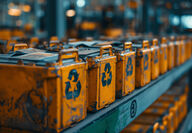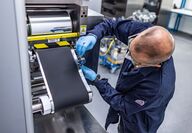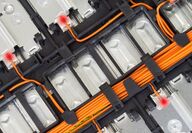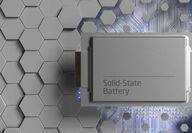Sorted by date Results 1 - 25 of 95

IAA Mobility 2025; Ducati V21L powered by QSE-5 solid-state battery. Debuting the world's first vehicle powered by its solid-state lithium-metal cells, QuantumScape Corp. joined Volkswagen Group's PowerCo SE in unveiling a Ducati motorcycle equipped with next-generation QSE-5 batteries during the automaker's press conference at IAA Mobility 2025 in Munich. Pursued for decades as the successor to conventional lithium-ion technology, solid-state batteries promise higher energy...

Injects an additional $131M into QuantumScape to accelerate next-gen EV battery rollout. To build future Volkswagen electric vehicles that travel further, charge faster, and operate safer than EVs powered by traditional lithium-ion batteries, the German automaker's battery company, PowerCo, is backing the accelerated commercialization of high-performance solid-state batteries developed by QuantumScape Corp. A year ago, PowerCo partnered with QuantumScape to advance the...

The plant in America's Heartland strengthens the mines-to-EVs battery supply chain in the U.S. A new link in America's electric vehicle supply chain was forged with the July 14 grand opening of Panasonic Energy's lithium-ion battery gigafactory in Kansas – a milestone that strengthens the nation's EV supply chain. "The opening of our Kansas Factory marks a major milestone in our journey to scale advanced battery production in the United States," Panasonic Energy CEO Kazuo T...

Redwood to repurpose GM EV batteries for U.S.-built grid energy storage vital to AI-era electricity demand. As AI data centers, electric vehicles, and renewables reshape America's energy landscape, grid-scale battery storage is becoming essential infrastructure. To help meet this rising need, General Motors is partnering with Redwood Materials to manufacture new U.S.-built batteries and repurpose second-life EV packs for stationary storage. "The market for grid-scale...

New center focused on providing industry-centric solutions for the challenges associated with battery recycling. With more than 30,000 tons of lithium-ion battery waste forecast to be discarded annually in Australia by 2030, a new national center aims to turn the growing end-of-life battery challenge into a resource opportunity. Led by the University of Adelaide, the newly established ARC Training Centre for Battery Recycling will focus on industry-led solutions to eliminate...

Next-gen graphene battery development advances under exclusive license deal with the University of Queensland. With a newly granted patent securing its foundational technology, Australia-based Graphene Manufacturing Group (GMG) Ltd. has strengthened its partnership with the University of Queensland to accelerate development of its next-generation graphene aluminum-ion battery. Formally launched in 2021 under the Australian Research Council Linkage Program, a multi-year...

One of three companies chosen for first US lithium-focused accelerator. Selected to help launch the United States' first lithium-focused supply chain initiative, Canada-based Nano One Materials Corp. has joined the Arkansas Lithium Technology Accelerator to support the development of a fully domestic ecosystem linking U.S. critical minerals to lithium iron phosphate (LFP) cathode production and downstream cell manufacturing. With over a decade of process development and...

Quino and TerraFlow team up on organic flow batteries for AI data center and microgrid energy storage. As demand for increased power and grid resilience surges during this global energy transition, a Texas-California partnership is quietly challenging the dominance of metal-heavy battery chemistries. TerraFlow Energy Pvt. Ltd., a developer of long-duration storage systems, has joined forces with Quino Energy Inc., a startup commercializing quinone-based electrolytes, to bring...

Lithium-vanadium design could help the U.S. sidestep the need for Chinese-sourced critical battery minerals. Boston-based startup Pure Lithium is racing to build a fully domestic plant for manufacturing lithium metal batteries that offer a homegrown alternative to traditional lithium-ion batteries that are heavily dependent on Chinese-sourced minerals. "We're working as hard as we can to build a prototype pilot facility," CEO Emilie Bodoin said in a Bloomberg Television...

Japanese battery manufacturer suspends construction on a $1.6 billion facility in SC, citing uncertainty. A major Japanese battery manufacturer has suspended construction on a $1.6 billion facility in South Carolina, signaling unease among global manufacturers as U.S. economic policy volatility casts doubt on long-term investment strategies and underscoring how policy shifts and geopolitical uncertainty are affecting the electric vehicle supply chain in the United States....

By developing the capacity to produce its own components for lithium-sulfur batteries, California-based Lyten has taken a step that could strengthen national supply chains and shift the balance of advanced battery manufacturing further away from Chinese control – offering a glimpse at how domestic lithium processing might help reduce America's strategic vulnerabilities. "Lithium is abundantly available across the United States, but the capacity to process lithium into b...

Aims to be first in lithium manganese-rich prismatic battery cells in the next 3 years. Positioning itself to beat rival Ford to market with the next wave of high-performance, lower-cost electric vehicle batteries, General Motors has unveiled a "game-changing" lithium manganese-rich (LMR) prismatic battery it says will cut costs, boost range, and establish competitive edge in electrifying America's trucks and SUVs. Unlike GM's current Ultium batteries, which depend heavily on...

Simple engineered material could set the benchmark for lithium battery conductivity. Scientists at the Technical University of Munich (TUM) have developed a new solid-state battery material that conducts lithium ions more than 30% faster than its contemporaries, setting a world record and opening new possibilities for next-generation energy storage. This impressive performance is significant for the future commercial viability of all-solid-state batteries (ASSBs) – a safer, m...

Standard Lithium develops more efficient low-temp process for producing the solid-state battery ingredient. Standard Lithium, working with Telescope Innovations, has developed a low-temperature method for producing lithium sulfide – a material vital to solid-state batteries like those under development by Toyota – that operates below 100 degrees Celsius (212 degrees Fahrenheit) and eliminates the high heat and complex infrastructure required by conventional processes. For over...

Alsym's water-based design is cheap and accessible for safety-critical industrial energy storage and high-density populations. Mukesh Chatter is on a mission to bring electricity to a billion people, a personal crusade that led to the founding of Alsym Energy and the development of a groundbreaking battery with the potential to revolutionize how the world stores power. Offering what may be a safer alternative to conventional lithium-ion batteries, Alsym Energy has developed a...

FEST battery tech outperforms lithium-ion in longevity and temperature. Stellantis and Factorial Energy have successfully validated automotive-grade solid-state battery cells using Factorial Electrolyte System Technology (FEST), demonstrating a significantly higher energy density than conventional lithium-ion batteries while balancing longevity and safety, key factors for real-world electric vehicle deployment, and surpassing 600 charging cycles, an essential milestone toward...

International scientific and market cooperation can create a diverse, resilient global battery ecosystem. The global battery industry has achieved a sea change, surpassing 1 terawatt-hour (TWh) in demand for the first time in 2024. As electric vehicle sales and energy storage needs grow, and overall production costs continue to fall, supply chain realignments are reshaping the industry. This expansion underscores the increasing role of batteries in both transportation and...

Researchers develop groundbreaking cathode material that resolves sulfur's key failings. A research team from Shanghai Jiao Tong University has developed a cathode for lithium-sulfur battery technology that mitigates three major limitations: poor conductivity, rapid capacity loss, and instability during charge cycles. By incorporating a highly porous, sponge-like metal-organic framework (MOF)-derived structure – built from metal atoms connected by organic molecules – the new...

Toyota's fluoride-ion batteries power up with copper nitride cathodes. All-solid-state fluoride-ion batteries (FIBs) have attracted interest as candidates for next-generation energy storage for electric vehicles and other applications; however, cathodes with sufficiently high energy density have been lacking. Researchers, in collaboration with Toyota Motor Corp., have unveiled a new cathode material for the company's FIBs, reportedly boosting the capacity per volume to about...

Samsung SDI, Hyundai and Kia team up on specialized batteries for an industry taking off. Hyundai Motor Company, Kia Corp., and Samsung SDI are teaming up to develop the next generation of robot batteries. This collaboration aims to tackle the issue of limited battery space, as current batteries are not optimized for the budding field of robotics, which has had to make do with ill-suited batteries off the shelf. Samsung SDI will develop high-capacity battery materials and effi...

By repurposing rust and leveraging seawater's natural chemistry, researchers have developed an inexpensive, scalable green battery solution. The U.S. currently generates over 15 million tons of unrecycled scrap iron waste each year, much of which turns to rust, but researchers at Worcester Polytechnic Institute (WPI) have developed a rechargeable alkaline iron battery chemistry that repurposes this discarded material for energy storage. Chloride ions – negatively charged ions...

True ASSB architecture is energy-dense, compact, safe, and ready to pilot. Microvast Holdings, Inc. has announced a groundbreaking development in battery technology with its True All-Solid-State Battery (ASSB), promising enhanced safety, higher energy density, and improved efficiency for critical applications such as powering data centers, electric vehicles, and robotics. By eliminating liquid electrolytes and introducing a bipolar stacking architecture, Microvast's ASSB aims...

Building a better (and safer) lithium-metal battery with simple, biodegradable ingredients. In a surprise revelation, lithium metal battery manufacturers might be receiving an interesting recommendation that is familiar to people all over the world: more water and fiber. Researchers at the Korea Advanced Institute of Science & Technology (KAIST) have developed a new protective layer made from plant-based hollow nanofibers, manufactured through an electrospinning process using...

Samsung's oxide-based battery with record-busting energy density is on time for mass production this year. In a move to stay ahead in the battery technology race, Samsung launched into solid-state battery chemistry and production research in 2020 with confident targets set, initially projecting the debut of its first prototypes by 2025 and their subsequent integration into electric vehicles by 2027. All-solid-state batteries (ASSBs) have a solid electrolyte instead of the liqu...

Retains capacity after thousands of cycles with improved safety, sustainability, and affordability. Researchers have developed an aluminum-ion battery that outperforms lithium-ion in longevity, safety, and sustainability, retaining capacity after thousands of charge cycles. By incorporating a solid-state electrolyte, this innovation curtails the fire hazards and resource constraints associated with Lithium-ion technology while offering a cost-effective and recyclable solution...